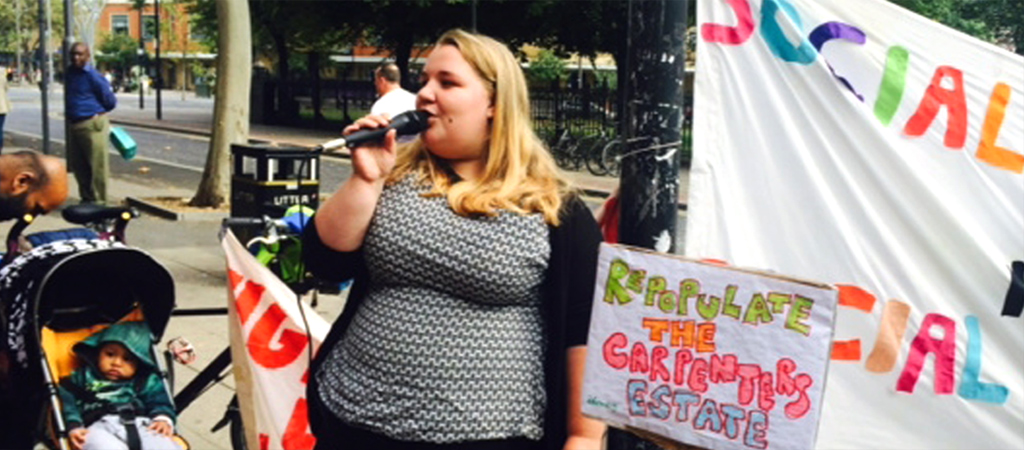The new Occupy? The activists reclaiming public space
 Symeon Brown
News Correspondent
Symeon Brown
News Correspondent
Mothers occupying houses, place-hackers scaling buildings and teens taking over shopping centres: Symeon Brown reports from the frontline of the battle to take back public space.
Video: Symeon Brown reports from the frontline of the fight for public space in London. Tune in to Channel 4 at 7pm for the full report.
Land ownership is becoming an increasingly hot topic, with the companies responsible for grabbing large amounts of land being placed under increasing scrutiny.
Earlier this year, Tesco was criticised for sitting on up to 4.6m square metres across 310 separate sites that do not currently house one of their stores in England, Scotland and Wales. It was estimated the land was enough for up to 15,000 houses.
We don’t have any choice but to trespass if we want to participate in our cities – Bradley Garrett
And the issue is being politicised: last year Ed Miliband announced plans to use legislation to grab land back from private companies who were holding land without developing it.
But the fightback against land privatisation is being led by a new class of activists who have become radicalised by what they see as declining public space.

For half a decade, Dr Bradley Garrett (pictured above right) has been pushing the boundaries of our cities to access the parts that he says are being kept from the public.
The University of Oxford academic has climbed the Shard and joined a group of “place hackers” – people who explore cities’ hidden and out-of-bound spaces – in the name of academic research, and has gradually become the godfather of a new movement of activists reclaiming privatised land.
Now Dr Garrett says there is a “bubbling angst” growing as a backlash to the restrictions in our cities.
“If you ask people to have access to these spaces, you won’t get it or if you do get it you are going to have to pay. And so we’ve got ourselves into this situation where we don’t have any choice but to trespass if we want to participate in our cities,” he told me.
“You don’t know land is private until you try and take a picture and are then accosted by private security.”
What spaces in your local area has been privatised? Tell us @channel4news or on our Facebook page
@Channel4News Here at Elephant & Castle, the 25-acre new town centre and park will be privately owned and managed http://t.co/k7vYKYiRvN
— 35% Campaign (@betterelephant) October 7, 2014

Mums v Newham council
The Olympic Borough of Newham has became a hostile battleground in the debate over private and public land.
Faced with relocation or homelessness after the council said it did not have enough homes for them, a group of young mothers formed the group Focus E15 and occupied a block of empty flats on the Carpenters estate that the council had said were not fit to be used.
Since their occupation of these private homes, and their publicity campaign, the council has now made a U-turn– a result the campaigners, who had no interest in politics before they were made homeless over a year ago, consider to be a win.
The occupation ended on Tuesday, but now Jasmin Stone (pictured above) said that she wants to fight against the council selling off public land to make way for flats that are being marketed at foreign investors.
“It’s quite obvious, you can see what’s happening,” she said, “because you’ve got all these plazas being built, big giant glass buildings, and it just seems that the council want to demolish them (council blocks) and build private accommodation that nobody in the local area can afford.”
Robin Wales, the Mayor of Newham council who still disputes that the council initially made any of the mothers homeless, said in a comment piece: “the 23-acre Carpenters estate requires urgent redevelopment. When our attempt last year to use vacant properties on the estate as temporary homes was legally blocked, we should have fought back, in court if necessary. We’re now making up to 40 of those homes available for homeless families.”

‘We want to be free’
Next door to the estate, a troupe of young skaters have been fighting their own battle to reclaim public space at the old Statford shopping centre.
For over five years, the youngsters have fought with security and the police over their right to skate in this space – the tatty, older cousin of the shiny new Westfield centre next door – and they have finally come to a mutual agreement: when the sun goes down, they are allow to come and go as they please.
“There are a lot of places that try and restrict us, but the main thing about us, is we want to be free,” said Tim Attidore, 24, founder of BOOM, the street skater team (pictured above).
“That whole period when you’re skating is just like, you feel free: you’re away from the world and nothing else matters apart from that time you’re skating.”
The only alternative to this space for many young people is the street, he adds, “so I think this is a good platform for young generation to show something positive.”
Space is becoming more and more expensive, but for the generation who are being outpriced and excluded, their attempt to claim it back is becoming more visible.
-
Latest news
-
As India goes to the polls in the world’s largest election – what do British-Indians think?6m

-
Tees Valley: Meet the candidates in one of the biggest contests coming up in May’s local elections4m

-
Keir Starmer says public sector reform will be a struggle7m

-
Nicola Sturgeon’s husband Peter Murrell charged with embezzlement of funds from SNP1m

-
Ukraine might finally get $60billion in American weapons and assistance to defend against Russia3m

-




